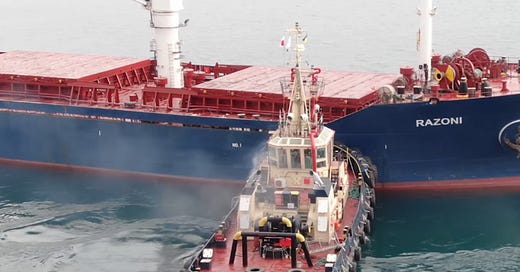After Russia Turned a Breadbasket into a Battleground, a First Shipment of "Corn and Hope" Leaves Ukraine
More shipments must follow, and the war must end, if the jolt to food security in some of the world's hungriest populations is to be overcome.
Live Update on Ukraine's Children Facing Russia's Unrelenting Invasion
UPDATES Aug. 4 - Ever so slowly, achingly, there are signs diplomacy can make at least a tiny difference in limiting wider harms from the brutal Russian invasion of Ukraine.
Following a set of agreements on safe transit of commercial food and fertilizer shipments negotiated separately with Russia and Ukraine by the United Nations and Turkey, a first shipment of Ukrainian grain - 26,527 tons of corn - left the battle-scarred silos of Odessa early Monday morning bound for Tripoli, Lebanon, where it is expected to arrive Sunday.
Guided carefully through mined waters by the Ukraine-owned tug Bulat, the Razoni, a bulk carrier flagged in Sierra Leone, headed out of the harbor for an inspection stop in Turkish waters before heading through the Bosphorus to the port of Tripoli.
Here's Ukrainian government footage from Facebook:
For anyone doubting the value of the United Nations (and I know more than a few people who do), hopefully this tiny step illustrates this institution's unique and vital role.
Some worry that the side agreement between the United Nations and Russia guaranteeing markets for its fertilizer and grain could indirectly legitimize the invasion. Read this July 24 story by Dulcie Leimbach on Passblue, an independent news site probing United Nations activities:
"For Russia, the deal could be a huge gain because it aims to remove all barriers, imagined or otherwise, that companies in finance, logistics and insurance circles may face when doing business with Russia, as they fear they will be fined and incur other black marks. These industries have also been hit the hardest in Russia from Western sanctions."
But if all goes well under the paired agreements, opening Odessa and other Ukrainian ports will not only provide about 25 million tons of grain for hungry populations but also help Ukraine's war-shattered economy.
In a Facebook post Monday Oleksandr Kubrakov, Ukraine's minister of infrastructure, said, "Unlocking ports will provide at least $1 billion in foreign exchange revenue to the economy and an opportunity for the agricultural sector to plan for next year."
That point about next year is crucial.
Putin's war is reverberating in a global food system that is also deeply vulnerable to climatic jolts including those generated by the persistent La Niña conditions in the Pacific that I wrote about in June.
This shipment barely scratches the nutrition gap that needs filling given the enormous role Ukraine's breadbasket plays in supplying corn, sunflower oil and other vital commodities to the Middle East and North Africa.
And there's no guarantee things will go smoothly.
As Richard Meade wrote in Lloyd's List today, "Before others follow the path set by Razoni and Bulat, insurers, diplomats and ship owners will be watching carefully what happens over the next 24 hours."
But it's important to celebrate small victories. And I liked what United Nations Secretary-General António Guterres said in prepared remarks today:
"This ship – the Merchant Vessel Razoni – is loaded with two commodities in short supply: corn, and hope."
Postscript - The ship is carrying something else special - a very courageous crew.
More resources
You can follow the track of the Razoni on MarineTraffic.com. Here's the snapshot August 2 at 11 a.m. U.S. Eastern time.
Explore the World Food Program's live hunger map to see where food stresses are most severe.
Food Worries Widen as Russia's Ukraine Invasion Turns a Global Breadbasket into a Battleground - my exploration of the hunger impacts of Putin's war, with agriculture experts from Ukraine and elsewhere
To Improve Climate and Food Futures, We Need More Awards and Rewards for Connection Makers - my recent talk with World Food Prize laureate Cynthia Rosenzweig
International Energy Markets and Food Insecurity in the Least Developed Countries: The Russia-Ukraine Crisis and Beyond - an interview with Harry Verhoeven, a senior research scholar at Columbia's Center on Global Energy Policy
Thanks for commenting below or on Facebook.
Subscribe here free of charge if you haven't already.
Send me feedback (including corrections!), tips, ideas here.
Find my social media accounts, books and music in a click here. And please share Sustain What with solution-focused friends and colleagues.







